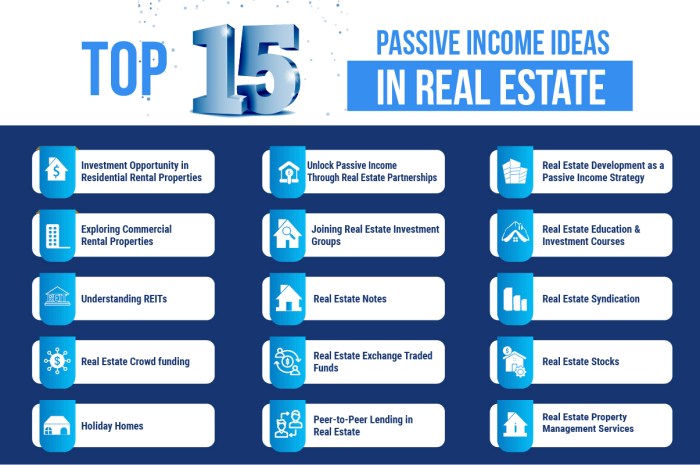Real estate investment ideas encompass a wide array of opportunities for investors seeking to grow their wealth through strategic investments. From residential properties to commercial ventures, this guide delves into the key aspects of successful real estate investments.
Exploring the various types of real estate investments, factors to consider before investing, financing options available, and popular investment strategies, this comprehensive overview provides valuable insights for both novice and seasoned investors alike.
Types of Real Estate Investments
Residential, commercial, industrial, and land are the main types of real estate investments. Each type offers unique benefits and drawbacks for investors to consider.
Residential Real Estate
Residential real estate involves properties such as houses, apartments, and condominiums. One of the key benefits of investing in residential real estate is the steady demand for housing, leading to potential rental income. Additionally, residential properties can appreciate in value over time. However, drawbacks include the need for ongoing maintenance and the risk of vacancies.
Commercial Real Estate
Commercial real estate includes properties used for business purposes, such as office buildings, retail spaces, and warehouses. Investing in commercial real estate can offer higher rental income compared to residential properties. Successful commercial real estate projects often involve long-term leases with established tenants. On the downside, commercial properties may be more susceptible to economic downturns and market fluctuations.
Industrial Real Estate, Real estate investment ideas
Industrial real estate comprises properties like distribution centers, factories, and manufacturing facilities. Investing in industrial real estate can provide stable rental income and long-term leases with reputable tenants. Industrial properties often benefit from strong demand driven by e-commerce and logistics industries. However, these properties may require specialized knowledge and expertise to manage effectively.
Land Investments
Land investments involve purchasing undeveloped or vacant land for future development or appreciation. Investing in land can offer the potential for significant returns if the property is located in a high-growth area. Land investments can also provide diversification for a real estate portfolio. Nevertheless, land investments may involve higher holding costs and longer investment horizons compared to other types of real estate.
Factors to Consider Before Investing

Before diving into real estate investments, it is crucial to consider various factors that can significantly impact the success of your investment. From location to market trends, property condition, and potential for appreciation, here are key factors to keep in mind:
Location
When it comes to real estate investments, location is paramount. A property’s location can determine its desirability, rental income potential, and overall value. Consider factors such as proximity to amenities, schools, transportation, and job opportunities. A prime location can lead to higher demand and better returns on investment.
Market Trends
Understanding current market trends is essential for making informed investment decisions. Research the local real estate market to identify trends such as price fluctuations, supply and demand dynamics, and market forecasts. Keeping an eye on market trends can help you anticipate potential risks and opportunities in the market.
Property Condition
Assessing the condition of the property is crucial before investing. Conduct a thorough inspection to identify any structural issues, maintenance needs, or potential repairs. A well-maintained property is more likely to attract tenants and retain its value over time. Factor in renovation costs if needed to ensure the property meets your investment goals.
Potential for Appreciation
Consider the potential for property appreciation in the long term. Look for properties in areas with growing demand, infrastructure development, or revitalization projects. Properties in high-appreciation areas can yield significant returns on investment over time. Evaluate the growth prospects of the neighborhood and surrounding areas to gauge the property’s appreciation potential.
By carefully considering these factors and conducting thorough market research and due diligence, you can make informed investment decisions and maximize the success of your real estate investments.
Financing Options for Real Estate Investments
When it comes to investing in real estate, choosing the right financing option is crucial to the success of your investment. There are different financing options available, each with its own pros and cons. It’s important to understand these options and choose the one that aligns best with your investment strategy and financial goals.
Traditional Mortgages
Traditional mortgages are a common financing option for real estate investments. They involve borrowing money from a bank or lender to purchase a property. The pros of traditional mortgages include lower interest rates and longer repayment terms, making it a more affordable option in the long run. However, traditional mortgages often require a good credit score and a substantial down payment, which can be a barrier for some investors.
Hard Money Loans
Hard money loans are another financing option for real estate investments, typically offered by private investors or companies. The main advantage of hard money loans is that they are easier to qualify for compared to traditional mortgages, making them ideal for investors with less-than-perfect credit. However, hard money loans come with higher interest rates and shorter repayment terms, which can increase the overall cost of the investment.
Private Money Lenders
Private money lenders are individuals or companies that provide financing for real estate investments. The key benefit of private money lenders is the flexibility they offer in terms of loan terms and repayment schedules. Additionally, private money lenders may be more willing to finance riskier investments that traditional lenders would not consider. On the downside, private money lenders often charge higher interest rates and fees compared to traditional financing options.
Overall, when choosing a financing option for your real estate investment, consider your financial situation, investment goals, and risk tolerance. It’s essential to weigh the pros and cons of each financing option carefully to make an informed decision that aligns with your overall investment strategy.
Real Estate Investment Strategies: Real Estate Investment Ideas

Real estate investment strategies are crucial for maximizing returns and minimizing risks in the real estate market. Various strategies exist, each with its own unique approach and level of risk. Let’s explore popular real estate investment strategies and how they work.
Buy and Hold Strategy
The buy and hold strategy involves purchasing a property with the intention of holding onto it for an extended period, typically to generate rental income and benefit from property appreciation over time. This strategy is considered relatively low-risk, as it provides a consistent cash flow and potential long-term gains.
Fix and Flip Strategy
In the fix and flip strategy, investors purchase a property below market value, renovate or improve it, and then sell it at a higher price to make a profit. This strategy requires a good eye for potential value, as well as knowledge of the local real estate market. It can be a high-risk, high-reward strategy depending on market conditions and renovation costs.
Wholesaling Strategy
Wholesaling involves finding properties at a deep discount and then assigning the purchase contract to another buyer for a fee. This strategy requires strong negotiation skills and a good network of buyers and sellers. While it can be a quick way to make money without owning the property, it also comes with risks such as finding qualified buyers and sellers.
Rental Properties Strategy
Investing in rental properties involves purchasing properties to rent out to tenants for a steady stream of passive income. This strategy requires careful property management and tenant screening to ensure profitability. While it can provide consistent cash flow, it also comes with risks such as vacancies and property maintenance.
Real estate investors like Robert Kiyosaki, Barbara Corcoran, and Donald Trump have successfully implemented these strategies to build wealth and achieve financial success in the real estate market.
In conclusion, real estate investment ideas offer a lucrative avenue for building wealth and securing financial stability. By understanding the nuances of different investment types, factors influencing investment decisions, and effective strategies, investors can make informed choices to maximize returns and achieve long-term success in the real estate market.


